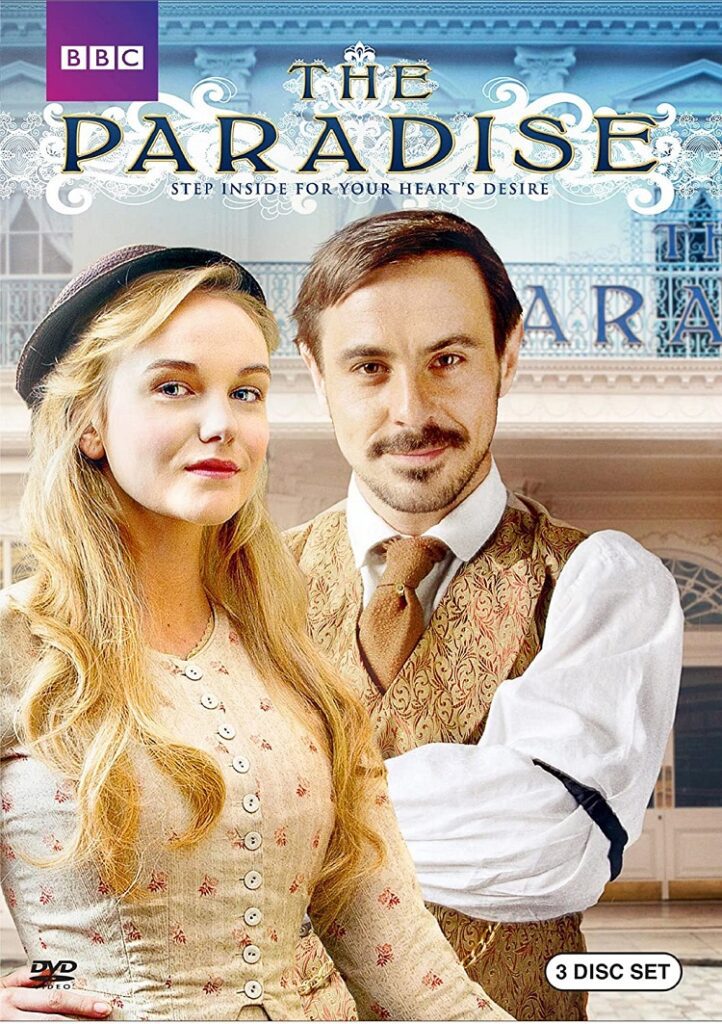
An adaption of Émile Zola’s novel Au Bonheur des Dames, this BBC television series is a sumptuous and sensual look at the first English department store. The Paradise is the creation of Bill Gallagher and has a total of two series’ under its belt thus far, with the first series now available on DVD thanks to the BBC.
There are eight episodes in the first season, each one running about an hour in length. Initially airing in the United Kingdom on BBC One in September of 2012, the series recently had its debut on PBS in the United States in October of 2013.
There are several compelling storylines involved in the first department store in England, as one might imagine, and the nature of ambition is a constant subject for the series. Set in 1875, the costume drama is the stuff of dignity and decency. Characters who are too outspoken are punished and the titular store functions under a code of ethics that asserts, among other things, the wickedness of careless hair.
The series opens with Denise Lovett (Joanna Vanderham) arriving in a busy and affluent northern English town fresh from her rustic rearing in Peebles. She means to join her uncle Edmund (Peter Wight), a humble draper, but business is not going well and he can’t take her on. Denise heads across the street to The Paradise, an intoxicating department store run by the chic Mr. Moray (Emun Elliot).
Noticing that a previous worker has been dumped unceremoniously on the street, Denise shows her opportunistic (or ambitious) side by applying for the vacancy. She is sent to ladieswear, where the strict Miss Audrey (Sarah Lancashire) assesses her and puts her on probation. Denise moves in with the rest of the workers upstairs and discovers the many mysteries of The Paradise.
The series also focuses on Mr. Moray himself, especially as he is romantically involved with the wealthy Katherine Glendenning (Elaine Cassidy). She has designs on marrying him, but his emotions are less vigorous. Still, he requires the funding of her father (Patrick Malahide) and thus makes some concessions to impress him.
Moray is intensely ambitious and makes for an interesting character, even if Elliot’s portrayal is a touch on the lukewarm side. That he must be agreeable to the women of the series moves him aside from the callousness that may have otherwise gifted his character with additional scope, but so it goes. Even as he ruthlessly insists on being first in all things, he’s just too bloody nice.
Outside of the character entanglements and romantic theatrics, the most captivating elements of The Paradise come when it focuses on exactly how such a department store moves units. Moray is a born salesman, informing women about what they’d look beautiful in and contending that customers give in to urges. He’ll do anything for a sale and his store has “eaten” the smaller retailers along the street.
Even as poor uncle Edmund, sweeping his front walk, suggests that customers prefer the lofty idea of “one person serving another” over rock-bottom prices, astute viewers will realize that history proves the sod wrong. The likes of Moray have swept gracefully and nicely into positions of supremacy after all and The Paradise is perpetual.
The DVD features all eight episodes of the first series of The Paradise and a behind-the-scenes featurettes. There are English subtitles, but they aren’t always helpful as there are no line breaks when another character is speaking.
Overall, this is a good-looking and sharp television series that features plenty of entanglements and goings-on. From the ever-looming Jonas (David Hayman) to a fifth episode battle with a barbershop that presciently explores the trouble with expansion, The Paradise is a satisfying if not entirely agreeable outing.